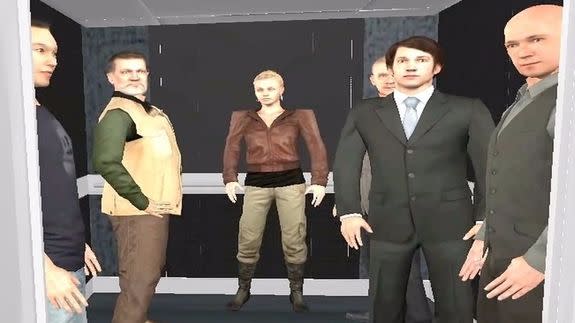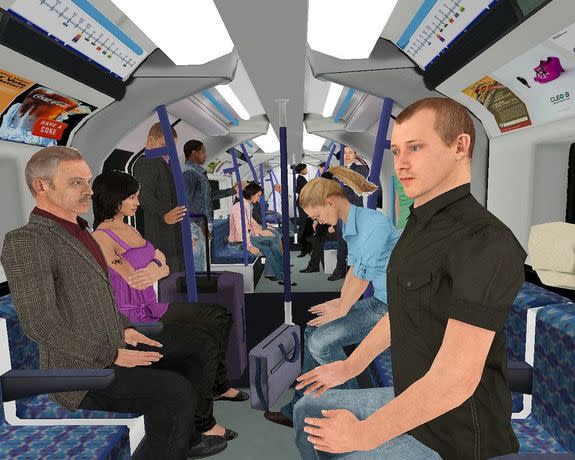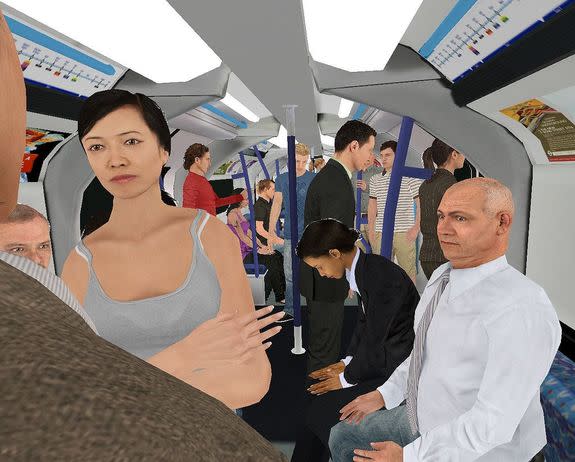Virtual reality may be useful for treating patients with anxiety

LONDON — The reach of virtual reality stretched even further this week with the publication of a study looking at how it could be used to treat people with clinical anxiety disorders, ranging from generalized anxiety disorder to social anxiety and even paranoia.
Researchers at Oxford University asked 30 patients who suffer from persecutory delusions — an extreme version of paranoid thoughts — to step into virtual environments, including a London Underground train and a lift or elevator, as part of the project. They aimed to show them that situations they feared were actually perfectly safe.
The results were published in the British Journal of Psychiatry.
SEE ALSO: This mobile game is using data from players to boost Alzheimer's research
The situations were designed to mimic real-life scenarios that the patients find stressful, with both spaces populated by a number of other people that grew over time.

Image: OXFORD UNIVERSITY
The participants, who were picked from patients of the Oxford Health NHS Foundation Trust, were given different instructions.
One group were told to use their normal defensive behaviours, and that while they might feel uncomfortable at first they would get used to it.

Image: OXFORD UNIVERSITY
The other group were instructed to take a more assertive approach, to learn that they were safe by approaching the avatars and standing toe-to-toe or looking at them.
The second group showed substantial reductions in their anxiety, researchers said, with more than half losing their severe paranoia at the end of the testing day. That number was reduced to 20% for the other group.

Image: OXFORD UNIVERSITY
Project lead Daniel Freeman from Oxford University’s psychiatry department said that the "exceptionally positive immediate results for the patients in this study show a new route forward in treatment."
"In just a 30 minute session, those who used the right psychological techniques showed major reductions in paranoia."
The study has limitations, however. For one, it was a small study, with participants only staying in the virtual world for a short period of time. It should be viewed as essentially a trial to see if and how cognitive therapy using VR could help treat delusions.
Nevertheless, one participant told the BBC he thought the experience would be "helpful in reducing any feelings of anxiety," and a spokesmen for the charity Rethink Mental Illness welcomed the innovation.
Brian Dow, the charity's external affairs director, told Mashable he was excited "to see cutting edge technology used innovatively to treat what can be an extremely frightening and disruptive symptom for some people experiencing mental illness."
"Research into mental illness is due [for] an upgrade, and we’re in desperate need of new treatments for conditions like schizophrenia, which is far behind physical conditions like cancer in terms of understanding," he said.
“We regularly hear from people with mental illness who are keen to get involved with research and this study shows what can be achieved by involving them in high quality research.”
Stephen Buckley, head of information at the mental health charity Mind, meanwhile, told Mashable: "These initial findings are encouraging, but, as with all areas of mental health, there is still more research to be done."
"Different people will find that different treatments help to manage their mental health — what is most important is that people have access to the treatment that works for them.”
Kathryn Adcock, head of neurosciences and mental health at the Medical Research Council, which funded the trial, admitted that "there is a lot of work to be done in testing the approach in treating delusions." However, she said that virtual reality is proving "extremely effective in the assessment and treatment of mental health problems."
Some 1 to 2% of the population has severe paranoia, the Oxford team says.
